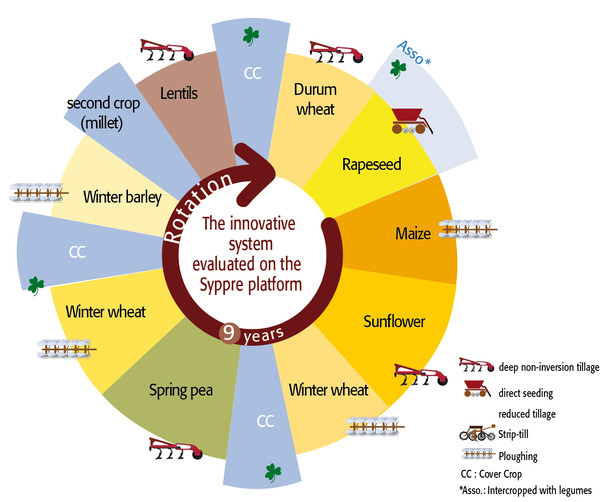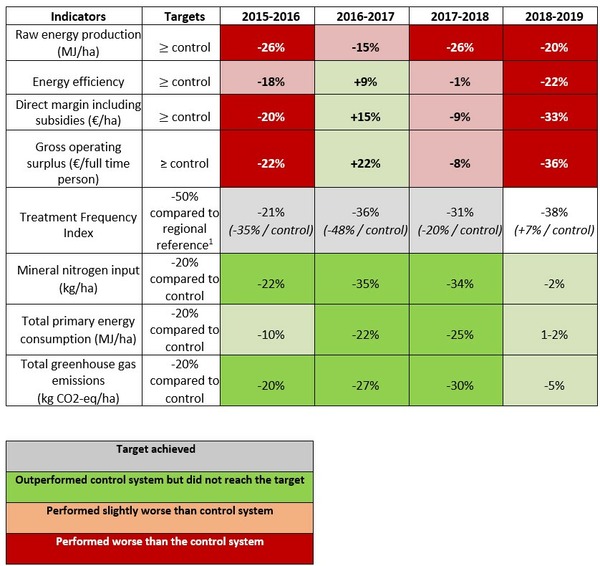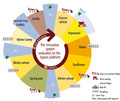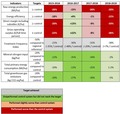The objectives of the field experiments in the Berry region of France were determined with the local partners. They focus on helping farmers reduce inputs without impacting their economic margin; this includes weed control and soil fertility to improve the robustness of their systems.
Two cropping systems were tested:
- A control system representing the typical crop rotation, with optimised cropping practices. The rotation consists of winter oilseed rape, followed by winter wheat and then winter barley.
- An innovative system (figure 1) aiming to address global issues (e.g., increasing or maintaining energy production and income, as well as reducing the treatment frequency index, mineral nitrogen use and greenhouse gas emissions) as well as local issues (e.g. soil fertility and weed control). The main innovations include:
- Lengthening and diversifying the crop rotation
- Introducing legumes as main crops, intercrops and cover crops to provide nitrogen to the cropping system
- Sequence of two spring crops to reduce the pressure of winter weeds
- Nearly permanent soil coverage with cover crop optimisation and multiple cropping in connection with reduced tillage
- Rapeseed intercropped with frost-sensitive legume crops
Reduced tillage or no tillage, as well as cover crops are important levers to meet the objectives. Another crucial issue for the overall technical, economic and environmental performance is the effective establishment of cash crops.
Results: reduction in inputs and environmental impact, but room for improvement regarding technical and economic results.
In the first four seasons, the management and performance of the innovative system was satisfactory, including disease and pest control. But it is difficult to achieve yield targets and control weeds without glyphosate, despite significantly lengthening the rotation.
Table 1 shows the annual performance of the site’s innovative system. It performed very well in terms of inputs and environmental impact reduction. Conversely, economic results are unsatisfactory and requires a reassessment of how to optimise the innovative practices involved. If this proves not to be enough, a modification of the system as a whole will be considered.
Both positive and negative results from the first four years of the field experiment have produced useful findings for all those wishing to undertake an agroecological transition in similar conditions (i.e. average clay-calcareous soils).
Some of the most promising findings from the innovative system include:
- Positive impact of the rapeseed-maize-sunflower sequence on foxtail grass control and on the following wheat crop’s performance
- Enhanced nitrogen utilisation and good performance of the intercropped rapeseed that was direct seeded after lentil - durum wheat crop
- Very significant reduction in the use of nitrogen and plant protection products
- Very moderate use of insecticides to control insects in rapeseed between 2015 and 2019
- Very good performance of intermediate cover crops sown in July
- Good performance of cover crops comprising phacelia, fenugreek, nyger, radishes and buckwheat over a short intercrop period, and faba bean-phacelia over a long intercrop period
- Advantages and robustness of lentils and sunflowers as diversification crops
- The pea - winter wheat intercropping reduces the development of diseases in peas
The findings also highlight some challenges and combinations that should be avoided:
- Poor foxtail grass control with 4 consecutive winter main crops (wheat, pea, wheat, barley)
- Pea-wheat intercropping makes blackgrass control more difficult and maintains the “take-all” plant disease, which negatively affects the subsequent wheat crop
- Maize and soybean were not robust enough, leading to higher dependency on fertilisation, and pest and weed control inputs
- Not using glyphosate exacerbates the issue of weed control and the poor effectiveness of stale seedbeds




 Souhaitez-vous ajouter le site web à l'écran d'accueil ?
Souhaitez-vous ajouter le site web à l'écran d'accueil ?
Disqus
Pour pouvoir utiliser la fonction de commentaire, vous devez vous inscrire auprès du fournisseur tiers "Disqus".
Lorsque vous activez cette fonction, votre navigateur établit une connexion directe avec les serveurs du fournisseur tiers. Nous attirons votre attention sur le fait qu’après l’activation, des données seront transmises au fournisseur tiers et que ce dernier pourra, le cas échéant, déposer des cookies, qui peuvent notamment être utilisés à des fins d’analyse et de marketing. Pour plus d’informations, veuillez vous reporter à notre déclaration de protection des données.
Activer